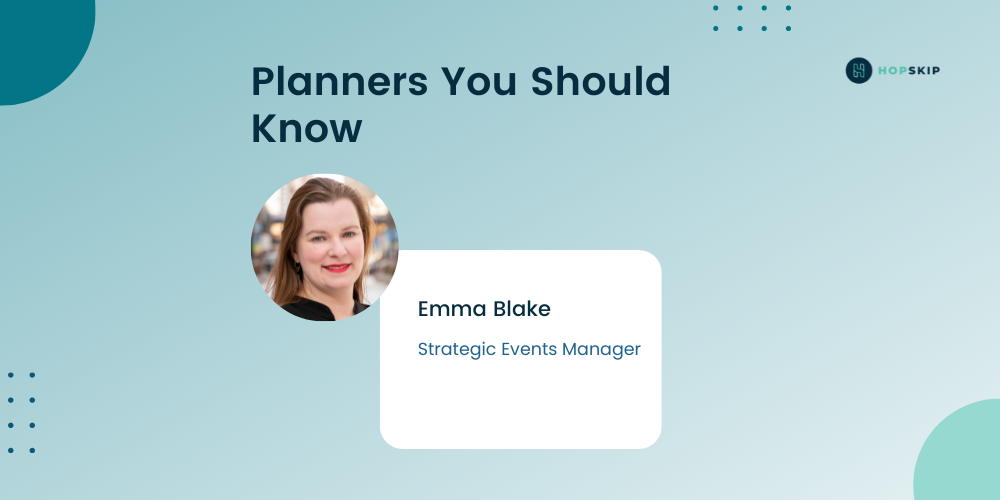This post is part of the HopSkip Planner Spotlight Series where HopSkip spotlights planners across the industry to bring awareness of how they adapted to COVID-19, communicating and lessons learned and sharing how they are viewing the meetings and events industry in a post-pandemic world.
Name: Emma Blake
Job Title: Strategic Events Manager
Years of Experience: 15
How did you get your start in the events industry? What made you pursue this role?
My career started in television production and after a few years I was looking to combine a more creative expression with my budget, timeline, and crew management skills - so I started a wedding planning company. That cemented my love for events and opened up a new path allowing me to pursue further opportunities in the events industry.
How do you compare planning your first in-person event post-pandemic, to planning meetings/events pre- Covid? What was different and unique? What was similar?
The big difference really was that we couldn't just flip a switch and go fully in-person post-pandemic. While gathering restrictions were lifted we had to plan to meet all guests where they were at individually and that meant that a hybrid model was the correct and only choice. We also had to be prepared to adjust the ratio of in-person and online guests in real time as people's comfort levels were changing weekly and even daily as we navigated the return to in-person gatherings. What didn't change was the focus on guest experience, whether in-person or online, we wanted guests to feel the event was well communicated, easy to navigate, inclusive, and enjoyable and that everyone was truly gathered together no matter which attendance style they participated in.
What was your number one challenge in hosting your first in-person event(s) and how did you overcome it?
The ever-present possibility that gathering restrictions could be put back in place and not knowing what that might look like. We prepared for the possibility by setting a limit on in-person guests that we were comfortable with and then booked a venue that could accommodate double that number. So the floor plan could be expanded or contracted if we needed more physical distancing. We also committed to a hybrid model from the earliest planning stages so in a worst-case scenario we were prepared to fully pivot to virtual if needed.
What is the top learning that you uncovered from the last two years that you’re implementing in your planning process today? (any other tips or tricks you want to share?)
Tech solutions and automation have come a long way and they changed and improved rapidly during the pandemic. If you find yourself doing a repetitive task manually there's probably a tech solution out there that can alleviate some or all of that pain! We use Teams a lot and I found it difficult to type good meeting minutes while on video calls. Now I use the record and transcript function to automatically do a big part of that work for me. I end up with a searchable document that I can more easily pull notes and action items from.
With hotels short-staffed, and RFP lead time shortening, what is your advice to other planners to overcome these obstacles when requesting hotels for proposals?
Clear communication around what items in your RFP are flexible and what are not. If the most important thing is the Friday night gala but really everything else can be moved around on the schedule, say that. I think your hotel partners are important event collaborators and letting them demonstrate creative problem solving at the RFP stage is a key part of the assessment for fit.
Are you approaching contracting with hotels differently, post-pandemic?
The pandemic reinforced the importance of reading and understanding contract clauses. We are all looking more closely at force majeure, service disruption, attrition, and cancellation and having conversations about the monetary and time cost of invoking those.
What is the biggest area of improvement that you think hotels can make when either responding to your RFPs or during the contract phase of your event?
Ironically, as I just spoke about the power of automation, I think there is room for improvement on the digital contract management side of things. It's often difficult to have multiple signers or allow clients or leadership access to review as they are tied to the planner's email access.
Due to the pandemic, our events community had to evolve, adapt, and grow. Many planners started to embrace new technologies as a result of the pandemic. What new tech are you using today in your planning process as a result?
Virtual event platforms that allow for customization and networking beyond just a zoom webinar.
Since education and relationships are two major pillars in the meetings and events industry, any suggestions on how other planners can learn and network with their peers across the industry?
I'm on the board of the Calgary chapter of ILEA (International Live Events Association) and it has been invaluable in terms of creating and maintaining my network of peers in the industry.
This post is part of the HopSkip Planner Spotlight Series where HopSkip spotlights planners across the industry to bring awareness of how they adapted to COVID-19, communicating and lessons learned and sharing how they are viewing the meetings and events industry in a post-pandemic world.
